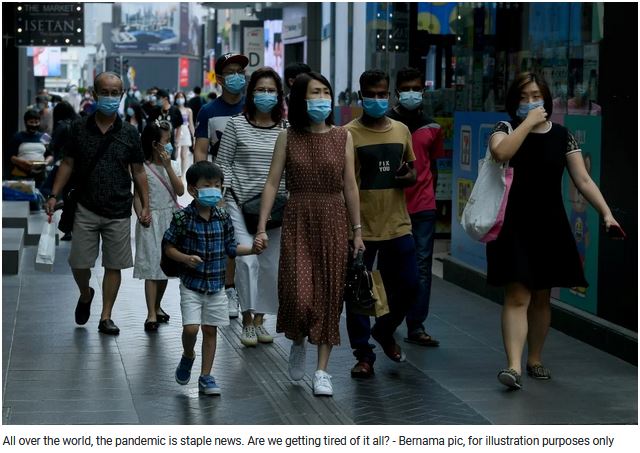Pandemic fatigue taking a toll on us
Emeritus Professor Tan Sri Dato' Dzulkifli Abdul Razak
Opinion - New Straits Times
October 5, 2020
REPORTEDLY, thousands of coronavirus patients, including many who were not ill enough to be hospitalised, have been suffering for months from fatigue and other symptoms.
This is very true when coupled with high temperature and breathing problems. This is now well known to those who are concerned about the pandemic. But there is another angle to this. Are we heading for Covid-19 pandemic fatigue instead?
Meaning, are we getting "tired" of the whole phenomenon related to the virus? All over the world, in various languages, the pandemic is staple news.
Print and broadcast media, as well as social media, continue to highlight Covid-19 infections and tragedies regularly, including the induced "violence", causing even more anxiety to some communities.
In spite of the repeated messages and communities being locked down, innocent lives continue to be wasted and millions still fall sick.
Not all subscribe to the simple instructions and suggestions of wearing masks, washing or sanitising hands and keeping a safe physical distance. Same with keeping away from crowded places or poorly ventilated rooms to break the transmission chain of the virus.
Thus, the pandemic keeps surging. The persistent infections and tragedies do not seem to be going away. At the time of writing, more than 30 million have been infected globally, while a million are dead and counting.
Malaysia, like many other countries, was so rudely awakened by the virus that few realised what was hitting them.
The epicentre was just nearby in China, and the feeling of insecurity was overwhelming. Add to this political uncertainty and the situation can easily turn into a nightmare.
It was so when the number of cases crept up slowly but surely, particularly when loved ones departed in such unusual ways. There was no sendoff to the burial ground.
There was no prayer or last rites and the like. The bodies were not given the usual wash, cleansing or shrouds. Instead, they were kept in body bags sanitised with potent disinfectants to prevent the spread of infection.
It was heartbreaking to see rows upon rows of new graves being dug, awaiting more victims of Covid-19. Fortunately, Malaysia was able to overturn the situation quickly. Thanks to measures and well thought-out procedures, dismantling red zones into green ones, with daily numbers falling from three digits to a single digit, with zero deaths reported.
Social distancing was replaced by physical distancing with social bonding and solidarity. Masks were made compulsory in public and at certain times.
Hefty fines were imposed, but the number of those who flout the law and standard operating procedure remains a matter of concern nationwide. Logically, the number should be on a decline as a sign of heightened awareness and commitment to fight the deadly virus after so many months of facing the challenge. It does not seem to be the case.
Could this be a sign of Covid-19 pandemic fatigue that people are beginning to let down their guard, as they feel more confident of controlling their lifestyles and situations?
More so when groups in the United States and Europe are resisting restrictions to their liberties and freedom, despite the looming number of deaths.
The World Health Organisation has advised those facing Covid-19 burnout to "Minimise watching, reading, or listening to news about Covid-19 that causes distress; seek information only from trusted sources. Get the facts, not rumours and misinformation. Facts can help minimise fears".
They are advised to listen to scientists. Be aware of sources that tend to undermine the credibility of scientists because of the confusion it can cause to the public. Still, new scientific insight into the virus can change experts' recommendations day by day, which can also cause confusion.
The total number of active cases in the country has now gone up to more than 1,000, bringing the country's cumulative total to 12,088 (up to Oct 3) since the outbreak began in January. If such a trend continues, the prevalence of pandemic fatigue can further complicate the situation.
The writer, a 'New Straits Times' columnist for more than 20 years, is International Islamic University Malaysia rector

